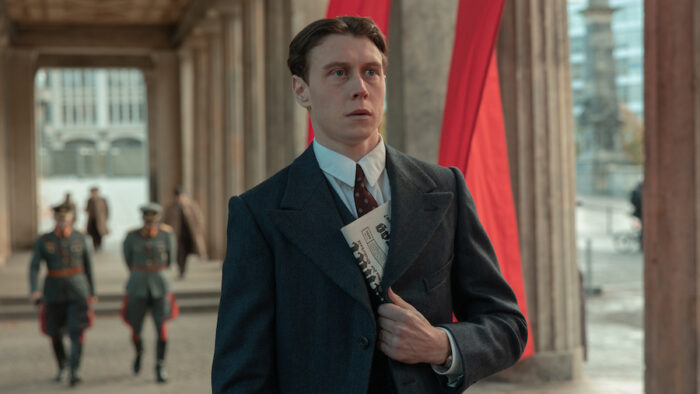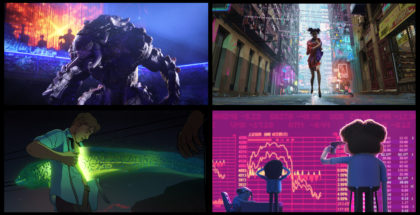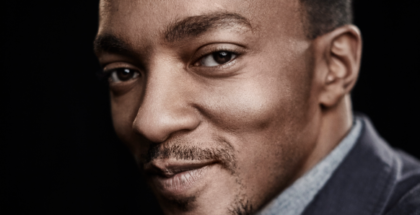Munich: The Edge of War review: A gripping, timely thriller
Review Overview
Cast
8Complexities
8Pace
8David Farnor | On 21, Jan 2022
Director: Christian Schwochow
Cast: George MacKay, Jannis Niewöhner, Jessica Brown Findlay, Jeremy Irons, Ulrich Matthes, Anjli Mohindra, Alex Jennings, August Diehl
Certificate: 12
What do cinema and secondary school history lessons have in common? A sizeable amount of time devoted to World War II. Munich: The Edge of War, though, finds a fresh focus through the lens of people finding themselves on the brink of war.
Based on the novel by Robert Harris, the film dovetails the brewing conflict through the friendship between two young men: Hugh Legat (George McKay), the private secretary to Prime Minister Neville Chamberlain (Jeremy Irons), and Paul Hartman (Jannis Niewöhner), a diplomat whose multilingual skills make him a useful translator for officials. We first meet them at Oxford in 1932, where they and a mutual friend, Lena (Liv Lisa Fries), form an inseparable trio. But, over time, ideological differences emerge and, after a visit from Hugh several years ago, they have all stopped speaking. It’s only as Adolf Hitler prepares to invade Czechoslovakia – prompting Chamberlain to arrange an emergency conference to try and keep the peace – that Hugh and Paul are brought back into each other’s lives.
The result is an against-the-clock thriller that sees Paul attempt to smuggle a document detailing Hitler’s invasion plans to Hugh, while both circle the fringes of the Munich talks. Director Christian Schwochow (who recently helmed the enjoyably slick TV series Bad Banks) keeps things moving at a brisk pace, with some beautifully shot sequences in both London and Germany that make the most of their locations and boast glossy period detail. Moving from flashbacks to fast-moving scenes in the present, where people worry about the impending future, it’s a gripping drama that comes front-loaded with foreboding.
While our knowledge of history’s foregone conclusions should mean that the suspense is somewhat diminished, the script – adapted by Ben Power (The Hollow Crown) – instead roots the tension in the human stakes: it finds just the right balance between the individual and national conflicts, allowing each to resonate with and drive the other.
The refreshingly international cast sink their teeth into the material, from Alex Jennings as the short-sighted traditionalist Sir Horace, Anjil Mohindra as resourceful typist Joan and, in a scene-stealing turn, August Diehl as Paul’s schoolfriend-turned-SS-officer Franz, who blends playground chuckles with chilling cruelty. Jeremy Irons brings cheerful hope and a slight hint of desperation to Chamberlain, who is willing to put his professional future on the line to avoid war, while Ulrich Matthes is chillingly understated as Hitler, who here prides himself on his ability to read other people, yet questions why he doesn’t always inspire affection in others.
That grander face-off is echoed neatly in the central contrast between the two friends from opposite sides of the Channel. George MacKay once again ably steps into a leading role as Hugh, a man accused of being distant by his wife, Pamela (Jessica Brown Findlay), but only because he’s thrown so much of himself into what he sees as his national duty; he’s a young man haunted by grown-up fears, all too aware that what he’s facing is bigger than him. Jannis Niewöhner is an excellent match for MacKay’s gaunt charisma, bringing a fiery, steely-eyed passion to the part of someone who is so sure of their beliefs that risk anything to achieve what they think is the right outcome.
It’s here that the film really sparks to life, in the way that it understands the complicated relationship between the personal and the political. A standout scene in a bar sees a younger Hugh and Paul disagree about the changing nature of German society, as the latter is won over by the promises of Hitler’s party. “You patronise us and you expect us to be grateful?” he challenges Hugh, after Legat tries to explain the dangerous seeds being sown by the deceitful authorities. That nuanced understanding of how people’s views can change – and be twisted – brings a depth to this intellectual study of where to draw the line between moral conviction and individual action. The result is a riveting espionage thriller that reminds us how complex the web of allegiances, trust and beliefs can be during tumultuous times. A timely watch that doesn’t ever feel like a history lesson.



















